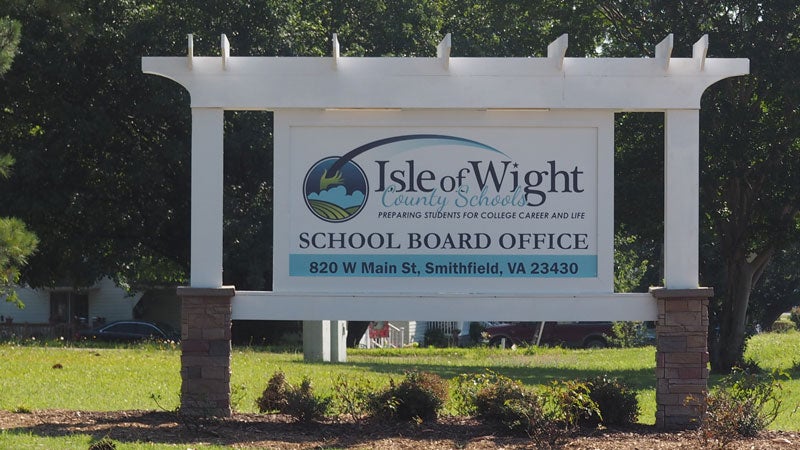Cramer: IWCS deficit resolved, spending freeze in effect through June 30
Published 3:50 pm Friday, February 9, 2024

- File photo
A divisionwide spending freeze through June 30 is a key component of Superintendent Theo Cramer’s plan to resolve Isle of Wight County Schools’ deficit from the prior school year.
IWCS exceeded its budgeted operating expenses by $703,151, or roughly $100,000 more than the $603,163 shortfall Cramer had acknowledged in August, and remained $345,717 in the red as of Jan. 2, according to an audit by the accounting firm Robertson Farmer Cox. Cramer says he’s now eliminated the larger-than-expected shortfall by pulling an equivalent amount from the current year’s budget, which is why the spending freeze is now in effect.
Cramer, at the School Board’s Feb. 8 meeting, made good on his January pledge to deliver a written report on the division’s corrective actions to date.
“This is a living plan that will be modified and adjusted as needed,” Cramer said.
“The division has worked hard to develop a plan that addresses audit discrepancies, internal process deficiencies, and shortfalls related to staffing,” said School Board Chairman Jason Maresh. “Dr. Cramer’s corrective action plan is a sound step towards ensuring this never happens again through continuous process improvement.”
Cramer said he’d shared his corrective action plan with Isle of Wight County Administrator Randy Keaton. Board of Supervisors Chairman Joel Acree, who’s five-member governing body serves as the division’s local funding authority, said on Feb. 9 that he hadn’t read Cramer’s report as of that date but expected to be briefed by an IWCS representative at the supervisors’ Feb. 15 meeting.
“I’m looking forward to their presentation,” Acree said.
What’s frozen?
“All requests for spending during the remainder of the fiscal year shall be validated” by Chief Financial Officer Larisa Harris “and approved by the Superintendent” before being paid out, Cramer’s report states.
Non-essential capital projects in excess of $70,000, including the repainting of school buildings and repaving of parking lots, have been put on hold.
All vacancies, with the exception of teachers, will go unfilled. Non-teaching positions deemed essential can only be filled if approved by Cramer, Harris and Human Resources Director Laura Sullivan.
“Staff will have to temporarily cover for vacant positions through the remainder of the school year,” Cramer’s report states.
Consultant contracts such as those that provide professional development training for staff have also “ceased for the remainder of the fiscal year” except for those in progress as of January and those supporting the finance or food services departments. Robertson Farmer Cox had identified turnover in the finance office and errors in the division’s processing of free and reduced-price school meal applications as contributing to its findings against IWCS. Existing consultant contracts for the instruction department will have “a significantly reduced scope of work.”
There will also be “no travel to out-of-state conferences, workshops or other non-mandatory events” unless they’re reimbursed by a federal or state grant.
The freeze does not apply to the School Board’s two-year spending plan for its $1.8 million share of state funds tied to Gov. Glenn Youngkin’s “ALL In” plan.
The state initiative – an acronym for attendance, literacy and learning – aims to combat chronic absenteeism and boost scores on Virginia’s Standards of Learning exams. Youngkin announced the plan and signed bipartisan legislation in September to fund it after scores from the prior year showed school statewide were still below their pre-pandemic pass rates.
Other measures taken
A “grants team” consisting of Harris, finance coordinator Lacey Winner, director of support services Todd Christiansen and other central office staff has been formed to process grant reimbursements for the current school year. According to the audit, reimbursement payments from awarded grants should be requested within 60 days of the June 30 end of the fiscal year, though $3.4 million in reimbursements from the 2022-23 school year had not been submitted as of Aug. 31.
Cramer has also changed the division’s organizational structure to specify that Harris now reports directly to him. Previously, Deputy Superintendent Christopher Coleman had served as Harris’ immediate supervisor. The finance department is to further “ensure that staff are cross-trained” and that more than one person has the necessary access to continue work in the event of an absence or vacancy.
IWCS is also to provide “additional support” to its new child nutrition liaison, Nelisa Vargas-Perez, who was hired in October.
“This is necessary due to the state requirement that there must be a second reviewer to ensure checks and balances of meal applications,” Cramer’s report states.
The School Board, from now on, is to receive monthly finance updates, to include “all major state or federal report due dates.” The 2022-23 audit had included a noncompliance finding tied to Isle of Wight’s having been more than three months late in filing the state-required financial data in its annual school report, which was due Sept. 15.
What about next year?
Cramer plans to request an increase in the division’s 2024-25 budget for additional finance department personnel. Currently, Harris’ department has five budgeted positions. One, the accounts payable technician position Winner occupied prior to her October promotion, is currently vacant.
Harris told the School Board that IWCS, based on its size, should “at least have two” accounts payable technicians, who are tasked with entering data into the county’s MUNIS financial system.





